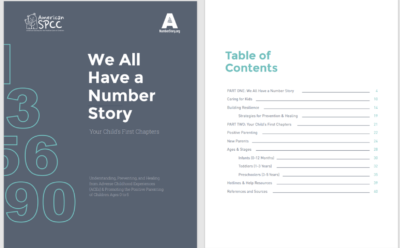With research showing much of a child’s brain development happens before the age of five, it is vital parents and caregivers of young children have easily accessible and impactful tools to guide them on their journey.
That is why the ACE Resource Network (ARN) and American Society for the Positive Care of Children (American SPCC) are partnering to offer a first-of-its-kind caregiver toolkit dedicated to a child’s earliest years.
Launched during National Child Abuse Prevention Month and at a time of growing awareness of Adverse Childhood Experiences (ACEs), the toolkit offers research-backed tools to support the positive parenting of babies and children ages 0 to 5, while providing an understanding of how childhood trauma often leads to negative health outcomes later in life.
The 40-page toolkit, titled We All Have a Number Story: Your Child’s First Chapters and developed by ARN and American SPCC, highlights what has been called one of the greatest public health crises to face our nation: the prevalence of Adverse Childhood Experiences, or ACEs.
“When parents and caregivers gain the tools and support they need to parent positively, they have the power to break cycles of trauma or abuse that may have been passed down to them as a child,” said Genevieve Rivera, Executive Director for American SPCC. “Education is key when it comes to changing our parenting patterns and ultimately building stronger, happier and more resilient children.”
To increase awareness of ACEs and their lifelong impact, ARN and American SPCC invite parents, caregivers, and professionals to a live conversation on Thursday, April 21 at Noon (PST) // 3:00pm (EST). The free webinar will help individuals build a deeper understanding of ACEs while offering strategies and accessible resources for preventing, reducing, and healing from childhood adversity.
Additional information on Adverse Childhood Experiences (ACEs):
Adverse Childhood Experiences, or ACEs, are stressful events or circumstances that occur during our childhood or teen years and include experiences such as abuse, neglect, and having a family member with a substance use issue. The more childhood adversity we experience without buffering supports to prevent toxic stress, the higher the likelihood that we may experience several challenges throughout life – from physical and mental health conditions, to educational, career, and relationship difficulties.
However, ACEs are not destiny. Research shows that increased awareness, early support, and evidence-based interventions can reduce negative impacts, and that prevention and healing are possible. We can disrupt inherited patterns and make changes as caregivers that shift not only our own futures, but those of generations to come.
About the Toolkit:
“We All Have a Number Story: Your Child’s First Chapters” toolkit is unique in its framework around the lasting impacts of our own childhood experiences as parents and caregivers, and how they may, in turn, affect our children, especially during the most critical stages of early brain development.
With seven chapters that cover such areas as building resilience, ages and stages, and guidelines for new parents, section one of the two-part toolkit focuses on addressing and preventing ACEs, childhood adversity, and toxic stress, while part two centers on positive parenting and early childhood development. By taking this dual approach, the toolkit provides a foundation of awareness and knowledge to parents and caregivers to help break cycles, pave new parenting paths and connect with people, resources and communities to create healthier “first chapters” in children’s lives.
“Understanding our own Number Story and the lasting effects of toxic stress experienced during our childhood is a call to action that can serve as a catalyst for change in the lives of our children,” said Sarah Marikos, Executive Director, ACE Resource Network. “The good news is that we can choose where our stories go from here and help disrupt the generational transmission of trauma while lifting stigma to ensure a strong start for our children.”
About the Webinar:
The webinar, which is free to attend, entitled Understanding Adverse Childhood Experiences (ACEs) for Parents and Caregivers: A Resource Sharing Session by Number Story and American SPCC, is a personal and professional development opportunity intended to provide hope and encourage healing.
Led by Joy Thomas who leads Community Engagement & Learning for the ACE Resource Network, and co-creator of the toolkit, the one-hour session will cover a deeper dive into understanding ACEs and explore accessible resources for self-care and stress reduction. For more information and to register, visit https://americanspcc.org/aces-signup.
About American Society for the Positive Care of Children (American SPCC)
American Society for the Positive Care of Children (American SPCC) was formed in 2011 as a first-of-its-kind 501 (c)(3) nonprofit dedicated solely to the prevention of child maltreatment and raising awareness of the lifelong impacts of adverse childhood experiences. By providing parents with the skills, tools, and educational resources that build their confidence and capacity as caregivers while strengthening family bonds, American SPCC aims to create a brighter future for all. Each week, more than 15,000 people from across the globe turn to American SPCC’s Parenting Resource Center — an online resource library geared towards parents and caregivers who want reliable and actionable parenting information.
About ACE Resource Network (ARN)
ACE Resource Network‘s goal is to reduce ACEs and other childhood adversity and to lessen their negative impacts. Through the sharing of information and access to tools and resources, ARN is working to advance a greater understanding of adverse childhood experiences and toxic stress and their short- and long-term impacts. In 2021, ARN launched Number Story – the first national public awareness campaign on ACEs intended to serve as an entry point to better understand our own personal story, and offer opportunities for hope and healing. For more information visit, Number Story or ACE Resource Network (ARN).

